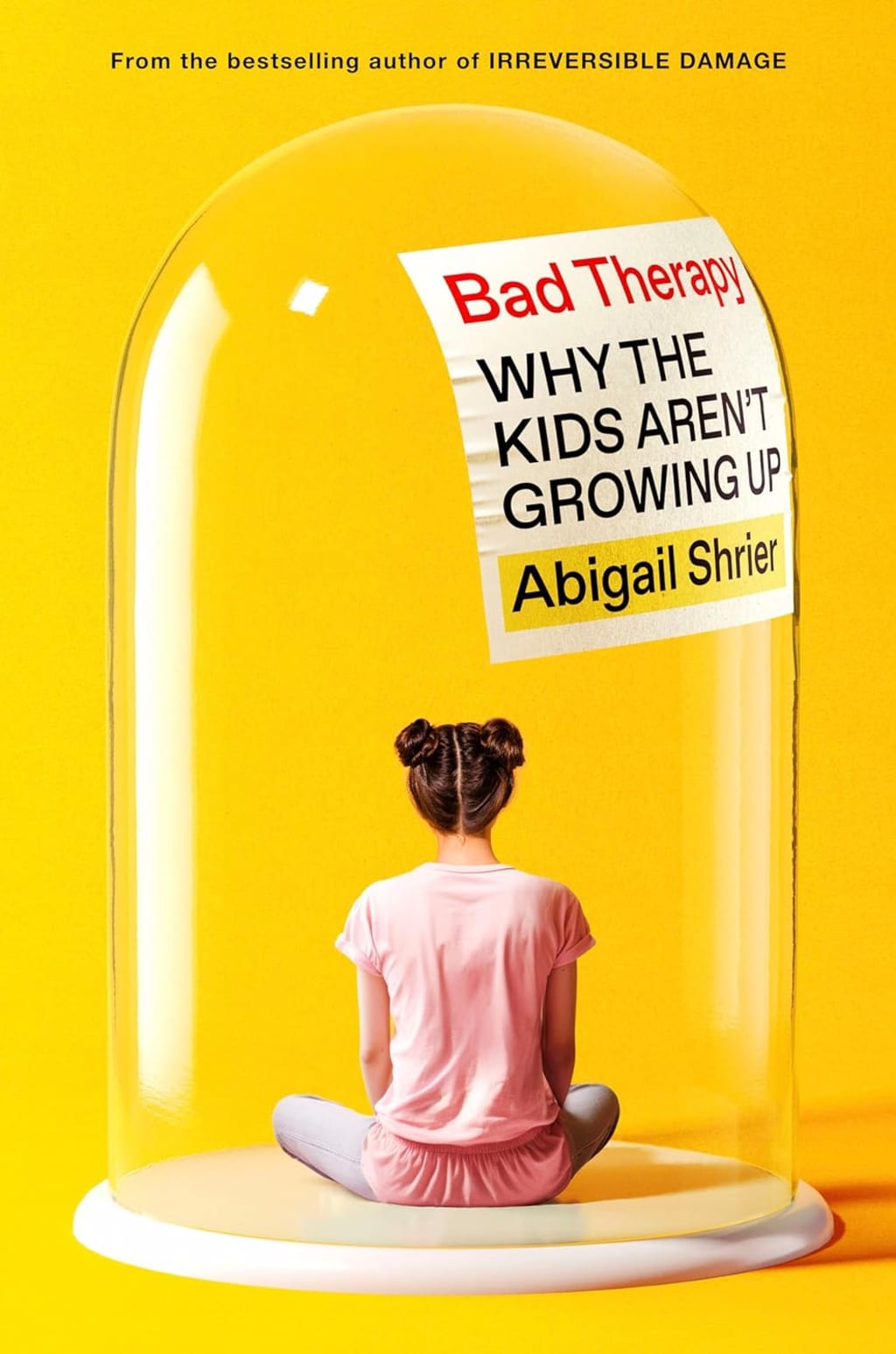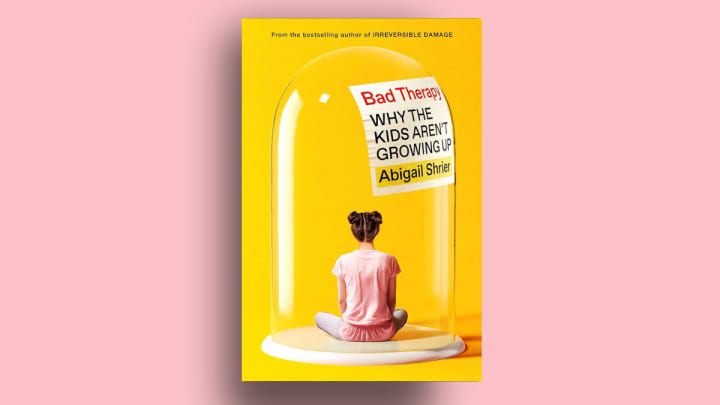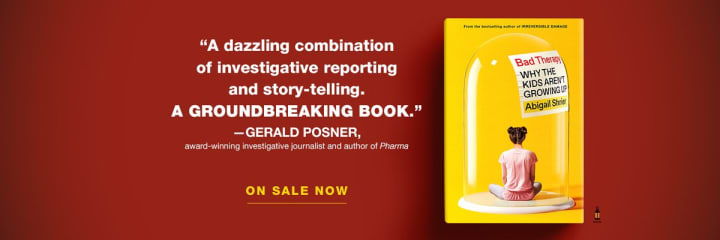Book Review: "Bad Therapy" by Abigail Shrier
5/5 - the mistreatment of a generation in therapy...

I have to be honest with you. I was actually just doom-scrolling through Kindle books when I came across this. I have never actually heard of it nor have I heard of the author but the premise of the book sounded pretty exciting. I guess you could count this as my ‘random book of the week’. It is about how Generation Z and to many extents, Generation Alpha are the most coddled, protected, loved generations, how they have had unlimited access to therapy and (more than any generation in human history) and have thus become the most mentally unstable generations ever seen. The question that the author poses is not ‘how do we blame this on the kids?’ But it is instead a more nuanced problem of parents putting their hopes in the psychologists who don’t always have the answers and, as I have come to understand, don’t always have the best intentions of the child in mind. So why has the most coddled generation in human history become the most mentally unwell? The reasons are actually pretty shocking in themselves and some, I could not believe were actually true.
It is revealed in the book that half of Generation Z think that they are not mentally well and even more of those are having therapy sessions more often than that of any other generation before them. This is usually to treat what are known as ‘conditions of growing up’ to other generations. Social anxiety, low level depression and OCD-like routines that may not actually be as bad as the actual disorder. But since receiving so much mental health help and having more prescriptions for mental health problems that any of the other generations even as the others grew up, we still have a pervading problem of mental illness amongst these younger people.

The author reveals that this may be due to two stark changes. First is the understanding of the older generations (parents of Generation Z) and parenting styles they think are effective. The other is the response from over zealous psychologists and psychiatrists who are not actually fixing the problem (this was the big one). The first change relates to the fact that older generations (Millennials, Generation X and Baby Boomers) have had parents who do not respond to their emotional needs and thus, grew up in a strange place between being happy and feeling unfulfilled and empty. This is something that they did not want to younger generation to face and so, they ran to therapists to try to find a solution. We therefore have the problem of over-compensation through parenting. Personally, I think it is essential to let children and teenagers feel consequence for a short amount of time in order to let them understand it - but remove consequence and you also remove the ability to feel rejection and sadness. Therefore, you remove the child’s ability to form their own coping mechanisms towards it. It shows that the parents may have had an essential input to what this generation has become.
The next stark change is the reaction of therapists and how they treat patients. Therapy, as former generations understand, is meant to be a short term solution to a problem and is meant to teach you how to deal with it. However, it has been researched by the author that many therapists in America no longer treat the disorders that require therapy and supervision, possibly even requiring interventions as they are much more serious. Instead, they would rather fill their timetables with the easy work of treating a teenager with anxiety as they can turn it into a lucrative long-term process, convincing impressionable teens that there is in fact, something wrong with their mental health that needs to be fixed. Yes, this big one suggests that therapists do not actually have the best interests of the patient in mind - giving young teens therapy on conditions that possibly just require them to gain an offline hobby or have bursts of exposure to social situations.

One of the other things I admired about this book in its exploration is not that it only blamed the parents and the zealous therapists, but it also points the finger at the change in how teenagers interact with each other. In former generations, you would go home and have little to no more communication with peers from school, but now kids have not only constant communication with peers but also constant communication with people they do not actually know. The up-keep of face must be abysmally difficult for someone who does not feel like they can switch off for the fear of being cut out of the loop.
One more thing I would like to talk about is a part of the book where the author is talking to a girl called ‘Nora’ (I am not sure whether this is her real name) and asking her questions about the types of friends she has. She states that all of her friends are in therapy but there are two types: one type have quite serious conditions that need medical attention and the other type have benign conditions that are more common. When Nora is asked why all of her friends are in therapy, she states that her generation are living through a time of emotional abuse and depression. But when asked to expand upon this - she can’t. And the author argues that it is not Nora’s fault. These teenagers have been taught by therapists that they have ‘unresolved traumas’ that need talking about. It is a fascinating look at how intense amounts of low-level and not very effective therapy that is self-serving has had a hugely negative impact on the younger generations of today. It even permeates to where teenagers have their ‘labels’ in the social media biographies next to their name, conveying that anyone who does not have these common conditions probably is ‘left out’ and feels such.

As someone who does not really believe that therapy is always the answer (and for someone who doesn’t think psychiatry is a real science - sorry guys) I feel like this woman has really hit the nail on the head when it comes to arguing for how the people around Generations Z and Alpha have been ruined by the adults in charge of them, whether on purpose or by accident. But the one thing I find the most interesting is how all of these different components have come together to give us a generation(s) of children who struggle to complete basic tasks. I remember reading books like “The Coddling of the American Mind” (which is more about my generation I think, a lot of it applies) and then there was the other one about Generation Z entitled “Time to Think”. This is another one of those eye-opening books on how the older generations have pushed Generations Z and Alpha into a strange corner.
About the Creator
Annie Kapur
200K+ Reads on Vocal.
English Lecturer
🎓Literature & Writing (B.A)
🎓Film & Writing (M.A)
🎓Secondary English Education (PgDipEd) (QTS)
📍Birmingham, UK






Comments
There are no comments for this story
Be the first to respond and start the conversation.